
© Jane Hobson. (Click image for larger version)
Lost Dog
Juliet & Romeo
★★★★✰
London, The Place
18 June 2019
lostdogdance.co.uk
www.theplace.org.uk
What sort of couple would celebrity lovers Romeo and Juliet have been had they lived? Would their almighty love have survived all the stresses and strains of marriage? Well Lost Dog (Ben Duke, Raquel Meseguer and Solene Weinachter) give us a version of what they might have been, imagining them as a modern-day couple with problems.
Juliet and Romeo is a clever work on many different levels. Not only does it present a convincing portrayal of a typical middle-aged, heterosexual couple struggling with their twenty-year-old, therapy saturated marriage, but it also disrupts Shakespeare’s narrative, offering us a version that is totally different but referential enough to capture the flavours of the original story and its legendary reflections on love and tragedy. There are also allusions made to multiple versions of Romeo and Juliet, from the bard’s script itself, to Baz Luhrmann’s film (1996) and Prokofiev’s seminal music (No 13 Dance of the Knights). But really Juliet and Romeo is a show about a relationship in crisis. Using a fluid interplay of text, movement and dance, Juliet played by Weinachter and Romeo by Duke present us with a performance about themselves, creating a work that is both hauntingly sad and at times endearingly funny.
The excuse for the couple to re-visit pivotal moments from their doomed lives is prompted by a therapy exercise. Juliet who does most of the talking and is the assertive, forceful one in the relationship explains that they are struggling: they are out of synch and have problems in the bedroom – here Romeo quickly stops her from sharing too much. They have tried every form of therapy and spiritual cure but this performance tonight played out in front of an audience is a last attempt to delve deep into their memories and try and salvage some vestiges of their former glamorous identities and their mythical, all-consuming love
Romeo, a rather dishevelled, monosyllabic man who’s never grown up keeps making mistakes. Initially he’s more resistant to this desperate self-help task of re-enactment than Juliet. It feels like his mid-life, post-celebrity crisis is worse than hers – that is until she’s experienced child-birth and post-natal depression. At first, he’s reticent and moody; he contradicts what Juliet says, he remembers things differently or not at all. When they individually re-enact their first meeting, in which he crashes Juliet’s fancy-dress party, (the Capulet ball), his version of events doesn’t correspond to hers. He recalls her dressed as a chicken rather than a Phoenix. But he reluctantly gets into it and awkwardly shuffles across the stage towards her dragging his legs along behind him as if wading through glue. He finds some of his original spark and fuelled by desire, clumsily throws himself at her swaggering with cow-boy hips, his upper body stiff with sexual tension, initiating jerky uncontrolled impulses. His display is a bit contrived and odd – Juliet looks on bemused. She remembers fireworks and magic, a bullet of energy hitting her as he glided elegantly towards her on that momentous night.

© Tristram Kenton. (Click image for larger version)
As they attempt to restage the final death scene, Juliet repeatedly throws herself into various corpse like poses, earphones on listening to music to get her into the scene. It’s a comical display imbued with more humour when he kneels over her lifeless body, ready to take his own life in order to join her in death, but suddenly thinks about a future without Juliet and decides that actually it may not be so bad. He puts the phial of poison back in his pocket and leaves, guarding his guilty secret.
They re-visit their first dance together as they partner in a strange, fragmented duet to Prokofiev’s portentous music. Strange holds, precarious lifts in which each manipulates the other rather too forcibly are not the conventional signifiers of romance. Movement sequences frequently jar with music extracts for comic effect; for example to Des’ree’s tear-jerking Kissing You which conjures the dazzling, anticipatory courtship of the young Leonardo de Caprio and Claire Danes in Luhrmann’s epic film, Juliet and Romeo enact a goofy, slapstick duo. Another striking duet which stands out is one performed by the pair after they’ve escaped from the tomb and arrive back at their home. It’s a violent, painful looking display of grappling contact work – accompanied by Simon and Garfunkel’s gentle, wistful Sound of Silence. Gripping, squeezing and pinning each other to the wall, dropping each other carelessly, they attempt to rip each other apart – their faces distorted with passion or hatred. It’s hard to read this sado-masochistic sex scene but it adds another gritty level to the work.
And so it continues, with both of them remembering slightly different version of key events, interspersed by confessional dialogues with the audience or fragile discussions as they tread carefully around one another. Juliet’s strength and optimism draining away minute by minute is so poignantly communicated by a glance, a word or simply silence.
In a final distressing altercation, when she in the grips of post-natal depression and plunging towards darker waters admits to having had an affair and they hurl devastating insults at each other, the dreams and memories disappear. Following this total break-down in their relationship, they tentatively dance one last time together in a touchingly tender duo to Ain’t No Mountain High Enough. As they nurse each other’s pain amidst the wreckage of their relationship, we believe that this couple have loved.
Lost Dog are superbly effective at evoking feelings of deep nostalgia and longing through their choice of sound-track, physical language and spoken word. In their manipulation of theatre and dance they question, on a much greater scale, the value of life and art, leaving us to reflect on this: Juliet standing alone at the mike, lip syncing to Wild is the Wind, exhausted, realising that she can never be that original, spirited, Juliet while Romeo stands outside the door, hurt and broken but finally answers the difficult questions that she asked at the beginning of the show. Two mismatched people separated by the cruelty of time.

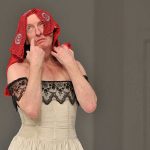
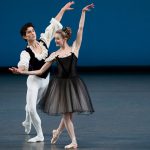



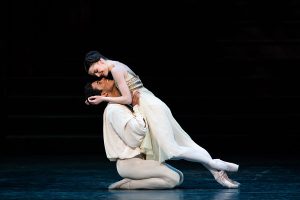
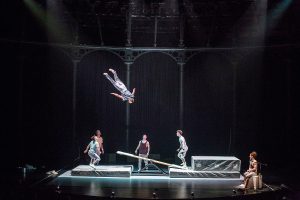



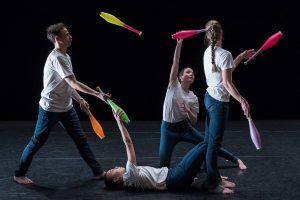

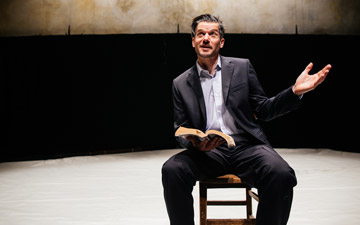

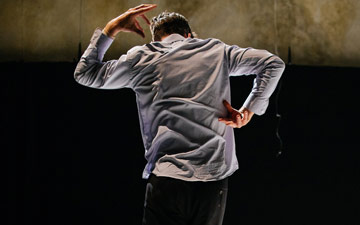

You must be logged in to post a comment.